VIPsight - 1st Edition 2018
COMPANIES
Bilfinger: Aftermath of a management disaster
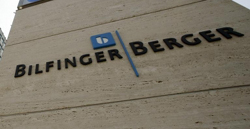 As a result of an investigation, the supervisory board of Bilfinger SE resolved to assert claims for damages against all of the former members of the executive board in office from 2006 through 2015 who joined the executive board prior to the year 2015. These former board members are accused of breaches of duty in the implementation of an orderly compliance management system. Also, it is assumed that some former executives also breached their duties in connection with M&A projects.
As a result of an investigation, the supervisory board of Bilfinger SE resolved to assert claims for damages against all of the former members of the executive board in office from 2006 through 2015 who joined the executive board prior to the year 2015. These former board members are accused of breaches of duty in the implementation of an orderly compliance management system. Also, it is assumed that some former executives also breached their duties in connection with M&A projects.
According to the current provisional calculation, the recoverable damage is expected to amount to a low three-digit million Euro amount. However, the precise amount of the damage claims and to what extent these can actually be asserted has not yet been determined.
The most prominent target of Bilfinger is Roland Koch, the former premier of Hesse, who acted as chairman of Bilfinger´s executive board from July 2011 through August 8, 2014. According to a report on Reuters, though, Koch said he is not aware of having done any wrong during his tenure and reacted with surprise to the decision by Bilfinger´s supervisory board.
Linde: Business Combination with Praxair might require
 The board of directors of Praxair, Inc. recently postponed its 2018 AGM (initially scheduled for April 28th, 2018) given that Linde and Praxair anticipate that the business combination will close in the second half of 2018. It is understood that the postponed AGM of Praxair would be held later in 2018 only if the business combination with Linde is not consummated.
The board of directors of Praxair, Inc. recently postponed its 2018 AGM (initially scheduled for April 28th, 2018) given that Linde and Praxair anticipate that the business combination will close in the second half of 2018. It is understood that the postponed AGM of Praxair would be held later in 2018 only if the business combination with Linde is not consummated.
A few days later Linde surprised its shareholders with the information that discussions with antitrust authorities have resulted in indications that merger clearance of the business combination of Linde and Praxair will be subject to requirements more onerous than previously assumed. Nonetheless, the news release also confirmed that the merger partners remain convinced of the merits of the business combination. Wouldn´t it be a nice idea to discuss this in more detail at an AGM?
Volkswagen Group: Dieselgate, Dieselgate and even more Dieselgate in the pipeline
 After billions spent as a consequence of unethical business practices, ongoing promises to do it right from (insert day depending on the occasion) on, and efficient blabla one might have thought that Volkswagen would finally start to work on its corporate culture to clean up the effects of a poor corporate governance. Probably wrong, since still so much efforts are made to preserve the status quo as long as possible rather than to correct wrongdoings and most of all the corporate governance and corporate culture.
After billions spent as a consequence of unethical business practices, ongoing promises to do it right from (insert day depending on the occasion) on, and efficient blabla one might have thought that Volkswagen would finally start to work on its corporate culture to clean up the effects of a poor corporate governance. Probably wrong, since still so much efforts are made to preserve the status quo as long as possible rather than to correct wrongdoings and most of all the corporate governance and corporate culture.
But even in Germany with its strong lobby groups promoting the car industry and its close ties with politicians this comes at a high price. This time, Audi was the target of the prosecutors, searching Audi´s facilities as well as the homes of several current and former Audi employees in an attempt to widen the inquiry into the manipulation of diesel emission tests. And it goes without saying that Audi ensured that it was cooperating with the authorities.
Daimler: Carmakers and politics don´t go well together, don´t they?
 “Look at situations from all angels, and you will become more open.” doesn´t sound like the ultimate marketing slogan. But when Daimlers´ Mercedes-Benz brand presented a white car on a beach along with this slogan in an Instagram post, it hit the spot. Apparently, the message was not welcome by Chinas communist party. Not only the content created a problem, but much more so, that it came from the Dalai Lama, who´s thoughts are in general not well regarded with Chinese authorities.
“Look at situations from all angels, and you will become more open.” doesn´t sound like the ultimate marketing slogan. But when Daimlers´ Mercedes-Benz brand presented a white car on a beach along with this slogan in an Instagram post, it hit the spot. Apparently, the message was not welcome by Chinas communist party. Not only the content created a problem, but much more so, that it came from the Dalai Lama, who´s thoughts are in general not well regarded with Chinese authorities.
According to the Chinese Xinhua news agency, the Daimler CEO Dietmar Zetsche and a local company official even sent a letter of apology to the Chinese ambassador to Germany, regretting the hurt and grief that its negligent and insensitive mistake has caused to the Chinese people.
The incident demonstrates once more that ethics and moral are not the strongholds of German carmakers, while politics and lobbying continue to play an important role. And by the way, did you notice Zetsche´s warning about a growing trend towards the political right with Daimler´s workforce? The timing may be just coincidental and most likely is not due to the incident on Instagram. But carmakers and politics anyhow don´t do well together, don´t they?
CECONOMY: Ongoing struggle for control over Mediamarkt-Saturn
Following the death of the co-founder and minority owner of Media-Markt, Erich Kellerhals, some market participants thought that the long-lasting battle between him and the majority owner CECONOMY for the control over Media-Markt soon might come to an end. Wrong assumption, as it turned out.
According to an article in Spiegel online, CECONOMY aims to acquire the shares owned by the inheritors of Kellerhals to settle the issue. The article also informed that the minority owners refused to sign the accounts of Media-Markt so far due to questions on certain valuations made. Without signed accounts, Media-Markt cannot payout dividends to its shareholders, thus limiting the dividend potential for CECONOMY shares.
Buhlmann's Corner
The silk road is what you make of it
 2018 is up and running and seems to be making a go of it. This is today’s upbeat, constructive message. True, Deutsche Börse missed a beat on Friday, March 16th a gremlin-spooked day, when, snowed under a mountain of derivates, and reeling from the effects of Brexit and bonuses, staff fumbled the button to signal the start of the day’s trading. Ironically the new (as it were) government in Berlin can now boast a Minister for Digital Infrastructure, a position filled by Andreas Scheuer.
2018 is up and running and seems to be making a go of it. This is today’s upbeat, constructive message. True, Deutsche Börse missed a beat on Friday, March 16th a gremlin-spooked day, when, snowed under a mountain of derivates, and reeling from the effects of Brexit and bonuses, staff fumbled the button to signal the start of the day’s trading. Ironically the new (as it were) government in Berlin can now boast a Minister for Digital Infrastructure, a position filled by Andreas Scheuer.
So much the better, therefore that despite the hiccup, Healthineers turned into a resounding success and Siemens made it home and dry yet again. Low interest rates kept the effects of a 45 minute delay in a 4 billion-odd Euro IPO payment at reasonable levels, indeed far less than what Mickey Mouse had to fork out to bring home the bacon. At last year’s SAP AGM, the motion on emoluments squeaked by on a handful of votes. Walt Disney wasn’t so lucky. In Houston last March 8th a 52 percent majority voted the motion down, paving the way for something more concrete. Those on salaries which, in per annum terms, have three zeroes before the millions column are about to learn all about bearing direct responsibility towards shareholders. Thanks to Bob Iger.
Perhaps we have reached a moment of energy transition in managers’ salaries. These last eight years have been hard on RWE and e.on with a series of restructuring initiatives and no lack of costly litigation. The upshot was separation of distribution from production pending a ruling by the German monopolies commission. Red light, or red light and full speed ahead?
Daimler would have welcomed a traffic light or two along the silk road from China. At this juncture in automobile history when all eyes are on diesel, Dieter Zetsche made no bones about his envy of Volkswagen, PSA Peugeot and BMW having their anchor shareholder. He and Bodo Uebber got busy only to find themselves forestalled by Geely Automobile Holdings of Zhejiane. Perhaps, then, top company management ought to learn Mandarin as a means for extolling the experience of rock solidity, acquired through Volvo and powered by the Lotus legacy of speed and agility not to mention the dynamism of the Asian market seeing that Daimler headquarters are located in Stuttgart, a city itself off limits to cars. Could this be the first faltering step towards a revival of the old Deutsche Bank/Daimler entente, a new Germany PLC under the roof of one or more Chinese holding companies?
More important though are the steps that the recently appointed German Minister of Foreign Affairs, Heiko Maas will take regarding the Chinese. A country that invests abroad without the involvement of local partners must grant its prospective foreign investors the same right (Beijing and surrounding districts). So, Mr. Maas, how long before light is shed on the issue?
DWS, Deutsche Bank’s most recent IPO shows how to go about it under that particular roof. To begin with, its legal form will make it an extremely hard nut to crack in terms of issues of governance, and then before going on the trading floor, it has two anchors that provide a one-third guarantee. The first anchor is held by Tikehau Capital Partners in Paris and marking the spirit of harmony and good intentions towards the countervailing powers, the second anchor resides with Nippon Life. A year ago Antoine Flamarion, Tikehau’s managing partner in charge of foreign business wisely pointed out “La simplification de notre structure actionnariale et de notre gouvernance sera un atout dans le cadre de notre développement”. Considering that their starting portfolio of 4 million Euros has ripped through the 10 billion Euro ceiling, John Cryan and Marcus Schenck could take a leaf from this Parisian book in their quest to simplify their accounts or perhaps how to get Temasek on board as a shareholder.
<more> "DWS GmbH & Co. KGaA: A not so perfect start on the stock exchange" - Capital News
ACTIONS CORNER
Fresenius: Doubts over planned acquisition of Akorn
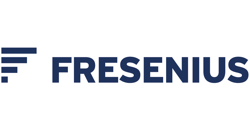 In a recent ad hoc-release, Fresenius SE provided guidance on its expectations for the year 2018 and its mid-term growth targets. The real surprise in this message turned out to be the information regarding an investigation into alleged breaches of FDA data integrity requirements at Akorn, Inc., relating to product development.
In a recent ad hoc-release, Fresenius SE provided guidance on its expectations for the year 2018 and its mid-term growth targets. The real surprise in this message turned out to be the information regarding an investigation into alleged breaches of FDA data integrity requirements at Akorn, Inc., relating to product development.
According to the release, the consummation of the (takeover-) transaction may be affected it the closing conditions under the merger agreement are not met. In a separate statement issued by Akorn on the same day, Akron added that the investigation has not found any facts that would result in an impact on Akorn´s operations and the company does not believe this investigation should affect the closing of the transaction with Fresenius. Nonetheless, the news sent the share price of Akron down by more then 30 percent.
Steinhoff International: Downgrade to SDAX level
It´s been a while since the negative news flow about Steinhoff International started. Recent bits and pieces included further irregularities with the financial reporting, ongoing changes on the management level, etc. Finally even BaFin became irritated and threatened to impose a fine.
And with its recent decisions on the indices composition, Deutsche Börse acted as well. In a press release, the company informed that Covestro will replace ProSiebenSat1 Media in the DAX index. In the same release, a side note mentioned that Steinhoff International will leave the MDAX index (downgrade to SDAX).
The (late) decision is a consequence of the rule set governing the indices composition. Unfortunately, these do not reflect the relevance of corporate governance issues in case of a corporate governance crisis . Perhaps its time to consider an amendment to the rules?
Deutsche Bank: Found a shortcut to affect its reputation
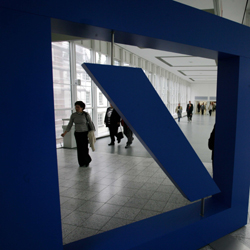 After a long phase of lousy results, a constant flow of bad news and the indication that 2017 will be the third consecutive year with an annual loss, Frankfurter Allgemeine Sonntagszeitung reported about Deutsche Bank´s decision to hike annual bonus payments to more than EUR 1 billion. According to the article, the move came amid concerns that otherwise investment bankers could be prompted to defect to more generous competitors.
After a long phase of lousy results, a constant flow of bad news and the indication that 2017 will be the third consecutive year with an annual loss, Frankfurter Allgemeine Sonntagszeitung reported about Deutsche Bank´s decision to hike annual bonus payments to more than EUR 1 billion. According to the article, the move came amid concerns that otherwise investment bankers could be prompted to defect to more generous competitors.
In recent years, the dummy argument that good and loyal employees might leave the company without high bonus payments has been used too often to justify extraordinary payments. Indeed, high bonus payments are justifiable if an annual loss occurred as a one-off incident and the reasons for the weak performance of the company are clearly addressed and under control. However, high bonus payments despite the third consecutive year with an annual loss might rather be an indication for a memory problem with the bank. If even the best are not good enough to make a profit, are high bonus payments really the best answer to address the problems? And by the way, does the management pay attention to the bank´s reputation?
Continental confirms ongoing examination aiming at an increased organizational flexibility
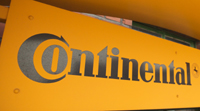 The speed of the innovation process in the automotive supplier industry is amazing. However, there is a clear segment differentiation, with electronics leading the pack, while traditional automotive industries did not show substantial breakthroughs in recent years. It is probably this background, which triggered Continental to take a closer look at its portfolio.
The speed of the innovation process in the automotive supplier industry is amazing. However, there is a clear segment differentiation, with electronics leading the pack, while traditional automotive industries did not show substantial breakthroughs in recent years. It is probably this background, which triggered Continental to take a closer look at its portfolio.
Following earlier speculations in the press the company confirmed that it is in early stages of analyzing how its organization can become more flexible in response to the “fast changing environment in the automotive industry”. Although the statement made clear that the evaluation is in its early stages still, it might become an interesting discussion topic at this year´s AGM to be held April 27th, 2018.
Thyssen-Krupp: Lively discussions at the AGM and ambiguous voting results
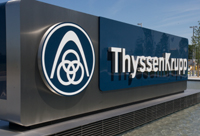 The restructuring plans of the thyssenkrupp management prompted a lively debate at this years´ AGM on January 19th, 2018. Already several weeks ahead, some critical voices could be heard. For example, the second largest shareholder, Cevian, made clear that it was dissatisfied with the strategic directions of the group and looking for a radical break-up. While this was discussed in more detail at the AGM, thyssenkrupp used the opportunity to explain its position to the audience. Referring to the recent past of the Group and the management´s plans, the CEO pointed out the managements view that the group is already undergoing substantial changes.
The restructuring plans of the thyssenkrupp management prompted a lively debate at this years´ AGM on January 19th, 2018. Already several weeks ahead, some critical voices could be heard. For example, the second largest shareholder, Cevian, made clear that it was dissatisfied with the strategic directions of the group and looking for a radical break-up. While this was discussed in more detail at the AGM, thyssenkrupp used the opportunity to explain its position to the audience. Referring to the recent past of the Group and the management´s plans, the CEO pointed out the managements view that the group is already undergoing substantial changes.
At first glance, the outcome of the voting at the AGM indicates a clear tendency in favor of the management´s position, with roughly 73 percent of equity represented and more than 94 percent of votes counted for the company´s proposals to shareholders. However, a closer look reveals a slightly different picture. While the number of shares casted for the dividend proposal equals approximately 73 percent of the total shares in issue (i.e. nearly all shares at present at the meeting), this number dropped to approximately 53 percent with most of the following agenda topics. In other words: 20 percent of the share capital present did not cast a vote at this AGM on most of the AGM topics. Perhaps this is an argument for the management to take a second look at the demands of the critical shareholders?
Note: In most AGM-systems used in Germany, abstention from voting is reported in the same category as are “not present”, “technical error”, “inadmissible”, etc. (if reported at all). Shareholders, depositary banks and advisors are often not aware of this specific feature, resulting in misinterpretations and other problems. Hence, VIP is requesting a change in the reporting to improve the transparency and enhance the quality of the information provided to shareholders about the outcome of AGMs.
<Abstimmungsergebnisse (voting results) 2018 - click here>
Kering (PUMA): Increased strategic flexibility for PUMA
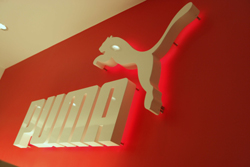 Kering, the French luxury group, which currently owns approx. 86 percent of PUMA, plans to propose to its shareholders to distribute shares equivalent to approx. 70 percent of the share capital of PUMA in the form of a dividend in kind.
Kering, the French luxury group, which currently owns approx. 86 percent of PUMA, plans to propose to its shareholders to distribute shares equivalent to approx. 70 percent of the share capital of PUMA in the form of a dividend in kind.
The step will result in a substantial increase in the free float in PUMA shares, enhance the liquidity in the stock and potentially pave the way for a later inclusion in indices like the MDAX. However, Kering´s largest shareholder, Artémis SA, is likely to receive 29 percent of the PUMA shares. Accordingly, PUMA will still have a key shareholder after the distribution, and the remaining free float would amount to 55 percent.
It goes without saying that the management of PUMA welcomed this move, since it provides additional strategic flexibility.
Politics
Linde: Temporary suspension of the review period for the business combination with Praxair
 Linde AG announced that the European Commission suspended the review period for the merger clearance regarding the business combination of Linde and Praxair with retroactive effect as of February 24, 2018, until information requested by the European Commission will be provided. Later, the European Commission announced that it will publish its decision on the merger clearance on August 9th, 2018.
Linde AG announced that the European Commission suspended the review period for the merger clearance regarding the business combination of Linde and Praxair with retroactive effect as of February 24, 2018, until information requested by the European Commission will be provided. Later, the European Commission announced that it will publish its decision on the merger clearance on August 9th, 2018.
According to Linde´s news release, the merger partners continue to work on completing the business combination as planned in the second half of 2018. The stakes are high. The combination with the smaller US-competitor would create a global market leader for this industry, and most market participants look forward to a successful completion of the transaction. However, the suspension of the review drew the attention towards a risk probably underestimated by many investors. The time left to complete the merger is limited. It needs to be completed soon, since the one-year-period to protect investors as prescribed by German law will end on October 24th.
People
RHÖN-KLINIKUM: Supervisory board puts up a fuss
 The supervisory board of RHÖN-KLINIKUM AG unanimously revoked the appointment of Dr. Dr. Martin Siebert as member of the Management Board of the company with immediate effect on March 28th, 2018, and unanimously appointed Dr. Gunther Weiß as additional member of the Management Board with effect as from 1 May 2018. After internal consultation, the chairman of the Management Board will submit a proposal for the future distribution of responsibilities within the Management Board to the Supervisory Board in a timely manner.
The supervisory board of RHÖN-KLINIKUM AG unanimously revoked the appointment of Dr. Dr. Martin Siebert as member of the Management Board of the company with immediate effect on March 28th, 2018, and unanimously appointed Dr. Gunther Weiß as additional member of the Management Board with effect as from 1 May 2018. After internal consultation, the chairman of the Management Board will submit a proposal for the future distribution of responsibilities within the Management Board to the Supervisory Board in a timely manner.
The ad hoc release did not provide further information regarding the background of the decision. Further clarification may be provided at the annual press conference of RHÖN-KLINIKUM on March 29th, 2018.
Capital News
DWS GmbH & Co. KGaA: A not so perfect start on the stock exchange
According to press reports, Deutsche Bank expected to receive about 2.0 bn Euro in return for the sale of 25% of the equity of DWS GmbH & Co. KGaA. Instead, it got 1.4 bn and sold 22.25% at a price of 32.50 Euro per share. What is more, it did not take long until the share price fell below the issue price.
So what is wrong with DWS? Definitively not the operating business, which seems to be getting along fine. But there seems to be some confusion in the market regarding the legal structure. DWS is a KGaA, which is a hybrid construction combining the structure of a private limited partnership with elements of a joint stock corporation. Since it is a private partnership, the legal structure of KGaA-shares can be constructed flexible. Theoretically, it would even be possible to grant investors governance rights similar to the position of owners of shares in a joint stock corporation. But for practical matters, more often the KGaA structure is simply used to bypass important corporate governance rights of investors.
Unfortunately, marketing and research people tend to shorten messages. “Well, it may not be a share in a joint stock corporation, but it still is a share in something and you can trade it like a share, can´t you? So just call it a share and it is easy to sell.” Looks like clever marketing at first glance – just don´t tell compliance about it.
<more> "DWS - The silk road is what you make of it" - Buhlmann's Corner
Deutsche Börse: Questionable remuneration to its former CEO
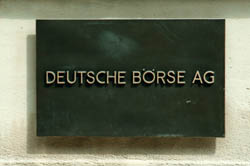 According to the recently released annual report for the year 2017, the former CEO Karsten Kengeter received in return for his investment of 4.5m Euro in Deutsche Börse shares under the terms of the Co-Performance Investment Plan of Deutsche Börse AG 68,987 so-called co-performance shares in the company. Unfortunately, it looks like this investment caused the prosecutors to start an investigation as regards a suspected insider trading.
According to the recently released annual report for the year 2017, the former CEO Karsten Kengeter received in return for his investment of 4.5m Euro in Deutsche Börse shares under the terms of the Co-Performance Investment Plan of Deutsche Börse AG 68,987 so-called co-performance shares in the company. Unfortunately, it looks like this investment caused the prosecutors to start an investigation as regards a suspected insider trading.
After all, the reputation loss Deutsche Börse suffered from this transaction is high. In addition, it is still unclear what the economical and other consequences for Deutsche Börse are. But at least the supervisory board will be monitoring “further developments of the investigation against Mr. Kengeter for alleged insider trading and will take any such developments into consideration (if necessary) for further decisions”. The report also informs that the company recognized a provision of approx. 7.5m Euro as a pro-rated entitlement for Mr. Kengeter in this regard.
Vonovia launches public offer for BUWOG shares
Vonovia published the offer document for its voluntary public takeover offer to acquire all shares of BUWOG. The offer, which is supported by the management board and the supervisory board of BUWOG, provides for a cash consideration of EUR 29.05 per BUWOG share, while the holders of BUWOG convertible bonds may receive EUR 115,753.65 in cash for each convertible bond with a nominal value of EUR 100,000 during the acceptance period from Feb. 5th, 2018 through March 12, 2018.
The completion of the takeover offer, which shall be financed via debt capital, is subject to reaching the mandatory minimum acceptance threshold of at least 50% plus one share of all BUWOG shares at the time of expiry of the acceptance period on 12 March 2018. With this transaction, VONOVIA intends to create advantages for shareholders and tenants via the combination of its residential portfolio of approx. 350,000 apartments with that of BUWOG (49,000 apartments).
Uniper: Fortum offer falls short of majority control
With only 0.47 percent of Uniper shares tendered on top of the 46.65 percent stake already acquired from E.ON, Fortums´ initiative to gain majority control of Uniper via a public take over offer failed. However, the transaction makes Fortum the largest shareholder in Uniper, once the deal closes later in the year. The transaction is still subject to regulatory and competition approvals.
Uniper`s interpretation that capital market participants believe in its strategy as an independent company may be correct. But will it really matter in the mid-term perspective?
Uniper: Shareholders hesitate to tender their shares
Fortum announced that during the initial acceptance period of its voluntary public takeover offer for the outstanding shares of Uniper 171,736,647 shares have been tendered. This corresponds to approximately 46,93% of the share capital of Uniper. The initial acceptance period ended on January 16th, 2018.
Shareholders still may tender their shares during the additional acceptance period, which runs until February 2nd, 2018. Fortum expects to report the total amount of shares tendered on February 7th, 2018, and to finalize the transaction, which is still subject to competition and regulatory approval, in mid-2018.
It should be noted that the reported number of shares tendered probably includes shares owned by E.ON, which held approx. 47 percent of Uniper.
Steinhoff International: When bankers talk too much…
Until it becomes really bad, the publicly known impact of corporate governance issues is typically limited to the shareholders. However, the recent earnings releases of U.S. banks provided a seldom exception from this rule. According to a Bloomberg article, Bank of America suffered from a USD 292m single-name non-US commercial charge-off in the fourth quarter. The article indicates that the bank got stung providing a margin loan that used Steinhoff´s shares as collateral.
Also, JPMorgan Chase acknowledged that Steinhoff was the cause of a USD 143m mark-to-market loss as well as USD 130m credit costs according to the article. Citibank declined to provide more details about a client event except for that it triggered a derivative loss of USD 130m and was responsible for roughly 90 percent of credit losses of USD 267m, but according to the article a person briefed on the results indicated that this was Steinhoff.
Interesting. I thought banks should not comment on individual customers. So where does all this information come from? In any case this type of news is not helpful for Steinhoff, but it helps to reduce concerns with the banks´ shareholders. However, compliance might not to be the strongest competency of these banks. Does anybody remember the causa Kirch?
Wirecard: Just another short attack?
Here comes the next super intelligence report, this time launched by the “Southern Investigative Reporting Foundation”. This publication caused a temporary dip in the shares of Wirecard by more than 10 percent – faster than most people could even read the text. Although, this is easy to read stuff, and the news content is relatively limited. Accordingly, this was more a “story” for those not familiar with the company and its history.
Conclusion: With all its complexity, Wirecard is a difficult to understand business. Investors should pay attention to what´s going on, particularly when it gets to the effects on the accounting level. If you don´t know what´s going on, you better just leave the shares (better even, investments in securities at all) alone.
Biotest AG: Sale of U.S. assets paved the way for the approval of the takeover by the Chinese Creat Group
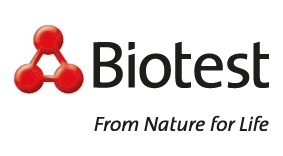 Biotech AG announced that with the trade approval by the U.S. Committee on Foreign Investment in the United States (CFIUS) the last remaining condition has been met for the takeover offer by Tiancheng (Germany) Pharmaceutical Holdings AG, an acquisition vehicle of the Chinese Creat Group Corporation. Accordingly, the unsolicited takeover bid announced on May 18th, 2017, for the shares of Biotest AG became effective. The bid valued the outstanding ordinary shares at EUR 28.50 per share tendered, while holders of the so-called preferred shares without voting rights will receive EUR 19.00 per share tendered.
Biotech AG announced that with the trade approval by the U.S. Committee on Foreign Investment in the United States (CFIUS) the last remaining condition has been met for the takeover offer by Tiancheng (Germany) Pharmaceutical Holdings AG, an acquisition vehicle of the Chinese Creat Group Corporation. Accordingly, the unsolicited takeover bid announced on May 18th, 2017, for the shares of Biotest AG became effective. The bid valued the outstanding ordinary shares at EUR 28.50 per share tendered, while holders of the so-called preferred shares without voting rights will receive EUR 19.00 per share tendered.
The approval is linked to the signing of a sale of the U.S. entities of Biotest. Until the sale closes, these assets have been transferred to a U.S. trust and qualify as discontinued businesses.















